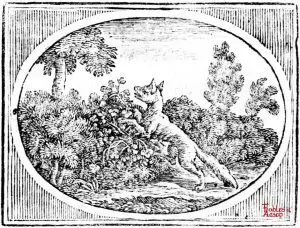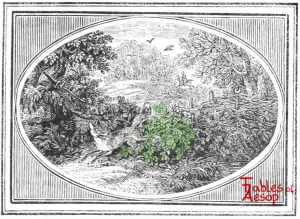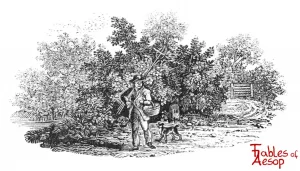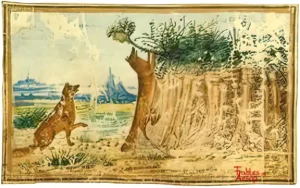A Fox fell into a Bramble and was cut. The Fox cursed the Bramble who then chided the Fox for being so careless as to fall into the Bramble.
Sometimes you have to ask your enemies for help.

Townsend version
A fox was mounting a hedge when he lost his footing and caught hold of a Bramble to save himself. Having pricked and grievously torn the soles of his feet, he accused the Bramble because, when he had fled to her for assistance, she had used him worse than the hedge itself. The Bramble, interrupting him, said, “But you really must have been out of your senses to fasten yourself on me, who am myself always accustomed to fasten upon others.”

JBR Collection
A Fox, hotly pursued by the Hounds, jumped through a hedge, and his feet were sadly torn by a Bramble that grew in the midst. He fell to licking his paws, with many a curse against the Bramble for its unkind treatment. “Softly, softly, good words if you please, Master Reynard,” said the Bramble. “I thought you knew better than to lay hold of one whose nature it is to lay hold of others.”

Samuel Croxall
A Fox, hard pressed by the Hounds, was getting over a hedge, but tore his foot upon a Bramble which grew just in the midst of it; upon which he reproached the Bramble for his inhospitable cruelty, in using a stranger, which had fled to him for protection, after such a barbarous manner. Yes, says the Bramble, you intended to have made me serve your turn, I know; but take this piece of advice with you for the future, never lay hold of a Bramble again, as you tender your sweet person; for laying hold, is a privilege that belongs to us Brambles, and we do not care to let it go out of the family.
THE APPLICATION
Impertinent people who are most apt to take liberties with others, are generally the most surprised, if they are retorted upon with any severity; though they, of all people, have the least reason to expect quarter. It cannot but be pleasant to indifferent spectators, when they see one of this fraternity meet with his match, and beaten at his own weapons. He that is known to be an ill man, may be hurt unpitied; his misfortunes are conferred upon him to the satisfaction of him that occasions them; and we do not look upon him as an object of pity, but an example of justice. This fable has an eye to a moral which has been already drawn from some others; and advises us to be captious whom we lay hold on, or meddle with, in too familiar a way; for, those who can lay hold again, and perhaps are better qualified for it than ourselves, are carefully to be avoided.

Thomas Bewick (The Fox and The Briar)
A Fox scrambling hastily over a hedge, in his flight from the hounds, got his foot severely torn by a Briar. Smarting with the pain, he burst into revilings and complaints at this treatment, which he declared he little expected to meet with for only passing over a hedge; and he could not help thinking it was very bad usage to be thus grappled by the long arms, and cut and wounded by the sharp crooked spines of a Briar. True, says the Briar, but recollect that you intended to have made me serve your turn, and would, without ceremony, have trampled me down to the ground: but none of your freedoms with me, Master Reynard; you may make a convenience of others perhaps, but the family of the Briars are not of that cast. Whoever presumes to use any impudent familiarities with them, is sure to smart for it.
APPLICATION.
Presuming and arrogant people do not hesitate to make a convenience, or a kind of stepping stone, of any one who will suffer them to do so; and if they can only get their turn served, no matter how, they use no ceremony, nor shew any delicacy in accomplishing their ends. But the selfish and impudent gentry, who are so apt to take liberties of this kind, now and then mistake their men, and are justly retorted upon; and however upon these occasions they may be surprized and angry, others, who are indifferent spectators, instead of viewing them as objects of pity, feel a secret satisfaction in seeing them suffer, as proper examples of justice.

L’Estrange version
A fox that was close pursu’d, took a hedge, the bushes gave way, and in catching hold of a bramble to break his fall, the prickles ran into his feet. Upon this, he layd himself down, and fell to licking his paws, with bitter exclamations against the bramble. Good words, Reynard, says the bramble, one would have thought you had known better things, then to expect a kindness from a common enemy, and to lay hold on that for relief, that catches at every thing else for mischiefe.
Moral
There are some malicious natures that place all their delight in doing ill turns, and that man is hard put to’t, that is first brought into a distress, and then forc’d to fly to such people for relief.

Gherardo Image from 1480

Rubus et Vulpes
Vulpes, cum sepem transiliret ac iam in praeceps casura esset, rubum, ut sibi auxilium ferret, apprehendit. At, eius pedes cum spinae transfigerent ipsaque graviter sauciaretur, ad eum conversa exclamavit, “Vae mihi miserae, quae, ut opem ferres, ad te confugi; tu vero me peius perdidisti.” Cui rubus “Errasti, amica,” inquit, “me apprehendere volens, qui omnes apprehendere soleo.”
Moral
Fabula demonstrat ita quoque stultos eos esse homines qui ad eorum auxilium confugiunt quibus potius nocere natura insitum est.
Perry #019



